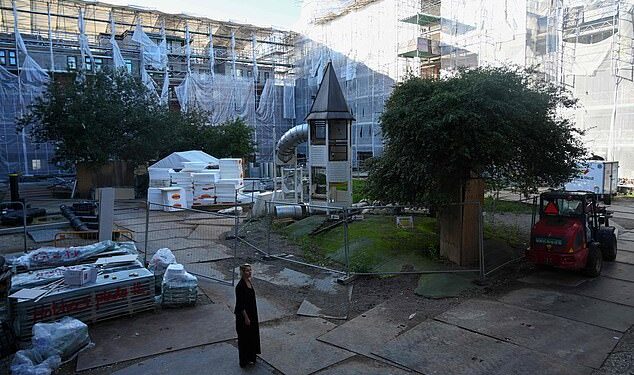A controversial bid to break up ‘ghettos’ of ‘non-Western’ immigrant communities in Denmark is set to be challenged in the European Union‘s top court after residents accused the government of arbitrary and racial discrimination.
Twelve residents from Mjolnerparken, a neighbourhood of Copenhagen affected by the programme, are suing the government over its policy, intended to encourage integration by allowing the eviction of residents in so-called ‘ghettos’.
The case will be heard by the court tomorrow, with those affected receiving support from the Open Society Justice Initiative and two UN special rapporteurs. The process is expected to last three to four months.
Susheela Math, senior managing litigation officer at the international NGO deemed the ‘non-Western’ label a ‘racialised categorisation’ based on ‘generalisations, assumptions and stereotypes’.
Controversially, the legislation has focused on so-called ‘parallel societies’ housing large ‘non-Western’ demographics, but also targets communities with low income, education and employment.
Residents say a success in court could set precedent to overturn efforts to break up ‘similar neighbourhoods’ across the country.
The sweeping package of laws stands to affect Danish citizens who moved to such communities as children, as well as settled residents from rich nations including Britain, per the Times.
The government has floated selling, redeveloping or demolishing homes in low income areas for several years, aiming to reduce the number of non-profit flats in the ‘hard ghetto’ of Mjolnerparken to less than 40 per cent of the total housing stock by 2030.

Majken Felle, head of the Copenhagen renters’ association, stands in the courtyard of Mjolnerparken housing estate in Copenhagen, Denmark, on August 28, 2023

Denmark is looking to break up so-called ‘parallel societies’ with large minority demographics
Minorities argue that the government is treating them as second-class citizens and the law is to be challenged in the European Court of Justice.
But the sweeping package of laws continues to receive support from cross-party MPs who urge something be done to force integration.
Majken Felle, an ethnic Dane and schoolteacher, is among those who stands to be evicted from her apartment because of the drive.
She is among the 12 residents of Mjolnerparken fighting the legislation. In an opinion piece penned last year, she insisted the attack on the neighbourhood not only unfairly represented the community, but would affect her ‘ethnic-Danish neighbours who moved here in the eighties’.
‘Our community knows that it is the government which is living in a parallel universe, and it is their discriminatory behaviour that is ripping apart Denmark’s social fabric,’ she wrote.
Eight out of 10 people in Mjolnerparken are deemed ‘non-Western’, with people from non-EU countries in the Balkans and Eastern Europe also falling into that category.
The ‘non-Western’ delineation excludes those whose families originate from places like the United States, Canada and Australia.
Successive Danish governments have backed the move since 2010, when it started compiling lists of housing estates marred by high levels of crime or non-Western residents.
The architect of the tough legislation, former Prime Minister Lars Lokke Rasmussen warned that the so-called ghettos could ‘reach out their tentacles onto the streets’ by spreading violence, and that because of ghettos, ‘cracks have appeared on the map of Denmark.’

Signs during a protest read (left) ‘They tried to bury us. They didn’t know we were seeds’ and (centre) ‘Where should we otherwise stay, Lars?’

Amid charges of racism, the word ‘ghetto’ was subsequently dropped from the measures
While the language changed, under accusation of racism, residents say they remain subjected to a ‘government-smeared smear campaign’, and that some have already ‘left or lost their homes’ as ‘victims of discriminatory law and creeping gentrification’.
The areas are typically those with social housing projects marked out – according to government figures – by low income, low school attendance, and low employment.
The plan is to reform them either by moving out residents and redeveloping the projects, or by demolishing some areas altogether.
Kaare Dybvad, the Social Democrat Minister for Immigration and Integration of Denmark, said previously that the existence of such estates risks undermining support for the welfare state.
When people lack solidarity with groups who have not integrated into Danish society, ‘then it’s very easy to be annoyed about paying 45 per cent in taxes,’ he said, as reported by the Economist.
The policy change is an admission of failure on the part of the government, who encouraged guest workers recruited by Danish companies in the 1960s and 70s, as well as refugees arriving in the 1980s, to the neighbourhoods.
While the government insists that tenants affected will receive help to move into public housing in non-‘ghetto’ developments in the same city, residents have since described the voluntary flight of neighbours ‘under pressure and uncertainty’.

The architect of the tough legislation, former Prime Minister Lars Lokke Rasmussen has warned darkly that ghettos could ‘reach out their tentacles onto the streets’ by spreading violence

Danes who do not live in the ghetto areas are free to choose whether to enrol their children in pre-school up to the age of six
With support from legal experts, residents in the so-called ‘hard ghetto’ of Mjolnerparken hope to set precedent that will help those in similar neighbourhoods.
‘A ruling in our favour would also have wider resonance for similar neighbourhoods across Denmark whose cases are currently on hold awaiting this decision,’ Felle said last year.
Notably, the policy has influence beyond Denmark. Neighbouring Sweden has shown interest in Denmark’s approach as a template for domestic policy, and in 2018 the Dutch governing party suggested adopting similar laws in the Netherlands.
Both face pressure from parties on the hard right to resolve perceived integration issues in migrant communities.







